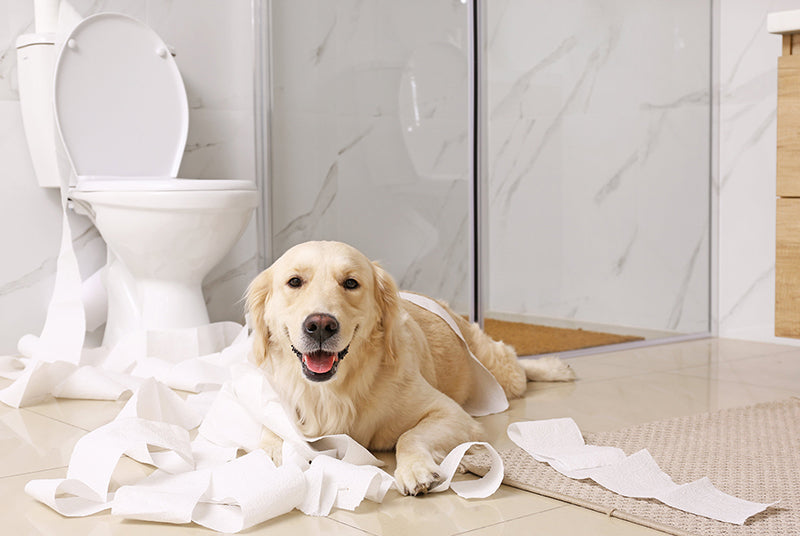When their Belly Barks: Gastrointestinal Complaints in Dogs
When your stomach grumbles or twinges, it can have many triggers. A human’s digestive tract, like that of our furry friends, is a sensitive system that is closely linked to the immune system. If something goes wrong, the whole body suffers. Food is often closely linked to stomach problems, however there are many other aspects that can impact stomach health.
If you watch your dog closely, you can discover a lot about the possible causes of gastrointestinal problems, or problems more generally. A so-called ‘symptom diary’ can be particularly useful for sensitive animals or those with food allergies, in order to observe long term patterns – what is good for your dog and what to avoid. Some helpful tips can have a preventive effect, but the following always applies: If problems persist, such as vomiting, diarrhoea, constipation, or visible pain when urinating, a trip to the vet and resultant treatment should be arranged as quickly as possible!
Their Stomachs don’t like cold food!
Dog food is often sold in tins, which need to be stored in the fridge after opening. Cold food can irritate a sensitive stomach, and as such, food should be put into the dog’s bowl a while before feeding time and left at room temperature. If time is of the essence, food can also be brought to a warmer temperature with a little warm water.
Change? No Thank You!
If you want to please your four-legged friend, stick with their favourites! While the same thing over and over again can be boring for us humans, a dog’s digestive tract actually reacts negatively to frequent food changes. Allergies, sensitivity to certain ingredients, or diseases that require consumption of specific foods, are the main reasons to change food.
Spices: A No-Go in food bowls
Dogs should, of course, not be given spiced or salty foods. Spices and certain other foods that are fine for us humans can often cause gastrointestinal problems in dogs. There are also some foods that can poison dogs, including avocados, nightshade plants (tomatoes, raw potatoes), onions and garlic, and chocolate.
Align feeding time with their Body Clock
While in the wild, it goes without saying that prey doesn’t run straight into a wolf’s mouth at 6pm every day. However, it is also important to recognise that dogs are domesticated, and so certain comparisons with their big brothers can be misleading. Fixed feeding times and quantities can actually help prevent digestive problems. Given that eating large quantities at once can cause gastric distension, spreading food out across several meals throughout the day is recommended.
Separate out the Pack
If you own several dogs, you may have already noticed how our four-legged friends gobble up their own food, and then go straight for each other’s bowls. For many dogs with others offers nothing but stress. Eating food so quickly can lead to vomiting, and as such, you should try to separate your dogs for feeding, particularly if there is so-called ‘food aggression’ – when dogs become very defensive whilst eating.
Nibbles for your four-legged friend
For many dogs, chewing or nibbling is a draining activity and a good pastime while their humans are away. Pig's ears are the classic chew however these contain a lot of fat and also have a high proportion of connective tissue that is excreted undigested, and many dogs suffer from diarrhoea as a result. Choosing low fat chews will help reduce this problem.
Feed Hygiene
Dirty food bowls are the ideal breeding ground for microorganisms such as bacteria, which can upset dog’s stomachs. Daily cleaning of their food bowl is therefore essential, especially if they are eating wet food. Once a week, the bowl should be rinsed properly, e.g., with boiling water or in the dishwasher.
Prevention and treatment
Selected plant extracts and prebiotic dietary fibres can support the growth of positive intestinal bacteria and help to build up healthy intestinal flora after an illness. Anyone suffering from diarrhoea can improve stool consistency with the help of apple pectin and psyllium husks - this applies to both humans and dogs. It is also important to supply nutrients that are often not sufficiently present in the body after acute diarrhoea. If toxins are the cause of a gastrointestinal illness, humic acids can support the binding and elimination of these. Humic acids are contained in large quantities in Leonardite, among others.
Our Golden Reliever Supplement contains a variety of valuable plant powders and functional ingredients that support general intestinal health in dogs. In addition to psyllium husks and pectin, Leonardite and soluble prebiotic fibres derived from sugar beet are used to restore the balance of important intestinal bacteria. To make it easier to take, the product is in powder form instead of tablets, making it easy to mix into your dog’s food.

Quercetin - A Versatile Plant Pigment
Breastfeeding Good for Mother and Child